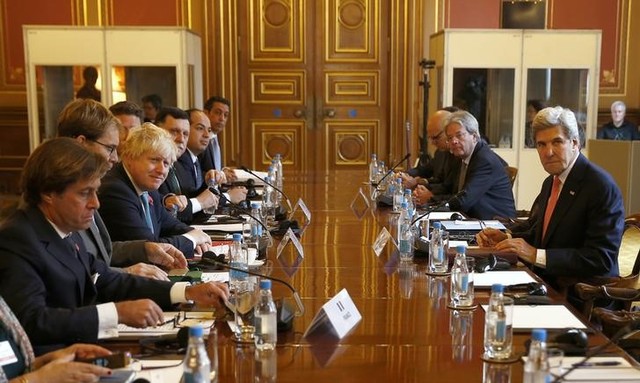Western powers voice support Libyan PM in standoff with rivals


By Reuters
Western and some Middle Eastern powers expressed support on Monday for Libya’s U.N.-brokered unity government and Prime Minister Fayez Seraj’s push to restore order across the chaotic country and revive its oil-based economy.
In London, officials from the United States, Britain, Italy, France, the United Arab Emirates and Saudi Arabia met Seraj for talks to tackle a standoff preventing the Government of National Accord (GNA) from expanding its authority outside the capital.
After the meeting, a spokeswoman for U.S. Secretary of State John Kerry said the ministers, who included British Foreign Secretary Boris Johnson and Italy’s Paolo Gentiloni, said they had reaffirmed the “strong international support” for the GNA.
“The ministers underscored their support for increasing the capacity of the GNA … to respond to the needs of the Libyan people,” State Department spokeswoman Elizabeth Trudeau said.
“The ministers also called upon all Libyan economic institutions to work together in support of this effort.”
Her statement did not indicate whether any concrete action might ensue from the pledge of support.
The meeting included a session that focused on Libya’s economy, in particular how to enforce economic decisions and stabilize the economy without a finance minister. The fractured North African state has two rival central bank governors and the GNA has been unable to appoint a finance minister.
Since the fall of dictator Muammar Gaddafi in an uprising in 2011, Libya has been beset by factional fighting among brigades of ex-rebels who battled him and then turned on each other.
Western powers are alarmed about resistance to Seraj and his GNA from the country’s eastern military commander General Khalifa Haftar, who has blocked a parliamentary vote to endorse the U.N.-backed authorities.
The parliament based in Libya’s east has twice rejected lists of ministers put forward by the GNA leadership meant to represent the various sides in Libya’s fragmented politics.
The failure to appoint a finance minister has hobbled economic decision-making in the major oil-producing country, an OPEC member. Monday’s meeting was to try to address ways to tackle Libya’s slide towards economic collapse.
Two other side-effects of Libya’s disorder are of major concern abroad – an uncontrolled flow towards Europe of migrants setting off in boats from Libya’s lawless shores where people-smugglers operate, and an infiltration of Islamic State militants who now hold some territory along Libya’s Mediterranean coast.